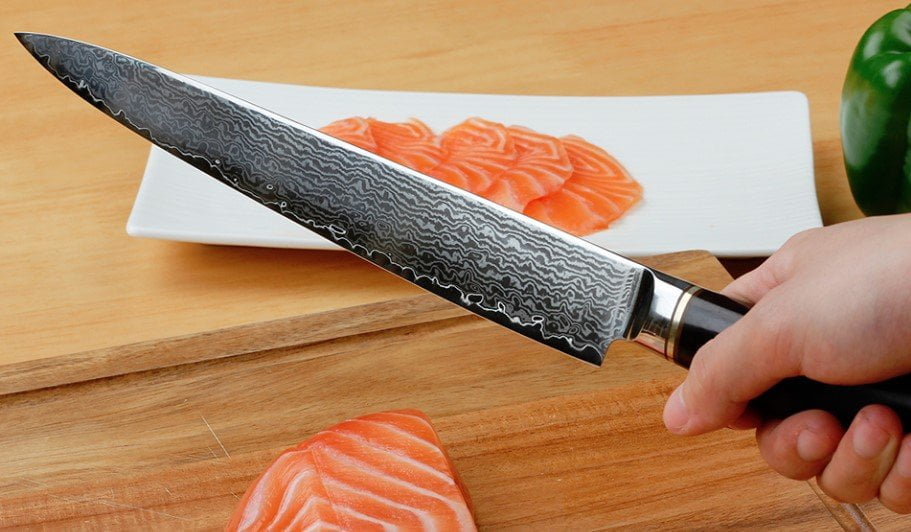In the world of culinary arts, a Damascus knife isn't just a tool; it's a masterpiece of craftsmanship born from centuries-old techniques. Celebrated for its distinctive wavy patterns and unparalleled sharpness, this knife has become an indispensable asset for kitchen professionals. However, to preserve the beauty and function of these revered blades, attentive care is crucial. These Damascus knife care tips can significantly extend the lifespan of your knife, ensuring it remains as stunning as the day you bought it.
We will delve into the specifics of maintaining these intricate pieces, offering professional chefs the insights needed to make their luxurious kitchen implements last. Not only do our tips aim at preserving the knife's aesthetic appeal, but also its functionality, which is pivotal in any professional kitchen.

Understanding the Unique Value of Damascus Knives
Before delving into care techniques, it's essential to understand what makes Damascus steel stand out. These knives are named after the capital city of Syria, where the process of creating such blades was originally developed. Often formed by welding different types of steels at high temperatures, Damascus blades boast an extraordinary toughness, edge resistance, and a brilliant patterned surface.
Many chefs prefer Damascus knives not only because they aid in precise cutting but also for their rich historical significance. Understanding this background enhances the appreciation and proper usage of the knife in a culinary setting.
Storage: Avoiding Corrosion and Damage
A critical part of Damascus knife care is proper storage. As elegant as these knives are, they require respect and proper handling. Always store them in a way that avoids contact with other utensils, as abrasion can diminish both the blade's appearance and its cutting edge.
Ideal storage solutions include magnetic strips, blade guards, or dedicated knife blocks. This ensures the blades remain sharp and free from accidental nicks or corrosion. Make it a point to dry your knife thoroughly before storage to prevent rust.
Cleaning and Maintenance: Simple Yet Effective Practices
One of the fundamental Damascus knife care tips is routine cleaning. Always hand wash your knife soon after use with warm water and mild detergent. Most importantly, dry it immediately with a soft cloth. Avoid soaking it in water or putting it in a dishwasher, as this can lead to moisture ingress and rust development.
Regular Sharpening: Maintaining the Edge
To preserve the knife's sharpness and efficiency, regular sharpening is essential. Use a whetstone, preferably with fine and coarse grits, to sharpen your Damascus knife. It's crucial to maintain the correct angle generally 15 to 20 degrees consistent with the original grind, to ensure a balanced and long-lasting blade quality.
Sharpening helps maintain a keen edge, vital for precision in food preparation. It's equally important to hone the knife regularly with a ceramic rod or honing steel to straighten the blade, which can slightly bend and lose alignment during regular use.
Additional Resources
To gain deeper insights into caring for Damascus knives, visit Shieldons guide which further elaborates on the history and significance of Damascus steel.
For further information on knife maintenance, exploring additional content like Damascus knife maintenance tips can be particularly beneficial.
Conclusion
The elegance of a Damascus knife lies not only in its appearance but in the timeless tradition it carries. By implementing these care tips, you can ensure your knife remains an effective and striking presence in your kitchen. More than a tool, a well-maintained Damascus knife can be a chef's trusted companion, its quality and reliability echoing through every slice.

Frequently Asked Questions (FAQs)
How often should I sharpen my Damascus knife?
For most kitchen professionals, sharpening your Damascus knife every 2-3 months should suffice, with regular honing in between to maintain a sharp edge.
Can I use harsh chemicals to clean my knife?
Avoid using harsh chemicals or abrasive cleaning materials as they can damage the blades surface and diminish its distinctive patterns.
What should I do if rust develops on my Damascus knife?
If rust appears, gently remove it with rust erasers or steel polish, ensuring that the affected area is thoroughly cleaned and dried to prevent further corrosion.
This article contains affiliate links. We may earn a commission at no extra cost to you.


























